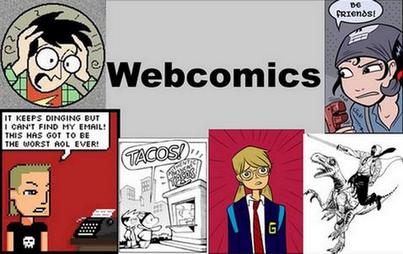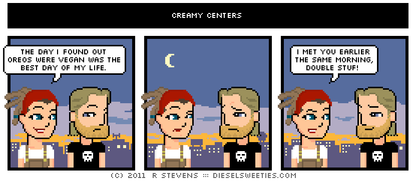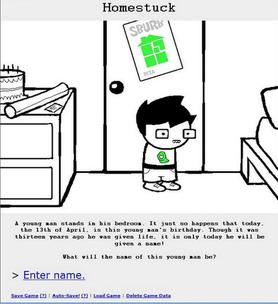Images copyright (left to right, top to bottom): Scott McCloud, Tom Siddell, R. Stevens, Tatsuya Ishida, John Allison, and Christopher Hastings
Managing Editor: Javier Medina
The internet has become an accessible medium for creating and distributing comics. Webcomics is a broad term that applies to any comic found exclusively or originally on the internet.
Many webcomics differ little in format from print comics. Some such comics have even achieved “crossover” success through syndication or comic books.
Many webcomics differ little in format from print comics. Some such comics have even achieved “crossover” success through syndication or comic books.
Others have moved into less traditional formats created by the online medium by blurring the line between comics and animation or eschewing the constraints of the page entirely.
Regardless of format, the main appeal and power of webcomics is the ability to directly connect the reader and the artist.
Annotations
Burns, Eric A., and Wedensday White. Websnark. 2011. Web. 27 June 2011.
Websnark, a webcomics blog ran by Eric Burns and Wednesday White, is a source for webcomics criticism. Through the use of humorous commentary, formalized concepts and consistent terminology, and near excessive amounts of tags, Websnark highlights recurring themes in current webcomics and helps connect readers to communities of webcomics creators.
Though somewhat limited in focus (Burns tends to focus more on his favorite comics than upcoming comics), Websnark’s greatest contribution to the study of webcomics is the consistent use of lexicon to help create a foundation of concepts and terminology to use in future analysis of webcomics as a genre.
Websnark, a webcomics blog ran by Eric Burns and Wednesday White, is a source for webcomics criticism. Through the use of humorous commentary, formalized concepts and consistent terminology, and near excessive amounts of tags, Websnark highlights recurring themes in current webcomics and helps connect readers to communities of webcomics creators.
Though somewhat limited in focus (Burns tends to focus more on his favorite comics than upcoming comics), Websnark’s greatest contribution to the study of webcomics is the consistent use of lexicon to help create a foundation of concepts and terminology to use in future analysis of webcomics as a genre.
McCloud, Scott. "I Can't Stop Thinking." Scott McCloud Journal. 2000-2001. Web. 6 June 2011.
In his series “I Can’t Stop Thinking” (2000-2001), Scott McCloud speculated about the internet as a medium for comics. His two major points were: Webcomics will transcend print boundaries (color, format, and length) and will allow the comic to have a more direct route to the audience, and to compensation.
McCloud’s posts can serve as a starting point for those interested in studying the origins and future of webcomics. His early entries into the genre show the untapped potential of the digital format. They also indicate how webcomics could be used to reinvent the comic industry through direct microtransaction payments.
In his series “I Can’t Stop Thinking” (2000-2001), Scott McCloud speculated about the internet as a medium for comics. His two major points were: Webcomics will transcend print boundaries (color, format, and length) and will allow the comic to have a more direct route to the audience, and to compensation.
McCloud’s posts can serve as a starting point for those interested in studying the origins and future of webcomics. His early entries into the genre show the untapped potential of the digital format. They also indicate how webcomics could be used to reinvent the comic industry through direct microtransaction payments.
Roberts, Garyn G. "Understanding the Sequential Art of Comic Strips and Comic Books and Their Descendants in the Early Years of the New Millenium." The Journal of American Culture (2004): 210-217.
This resource mainly focused on the transformation and evolution of comics in America. Ranging from Charles Shultz’s newspaper adaptation of comics, Peanuts, in the Cold War era (1940’s and 50’s) to the making of comics into blockbuster films such as Men in Black (1997) or more recently, The Dark Knight (2008). The text mentions that although comics have dealt with difficulties in the past, they are a thriving market now.
This text could be useful in scholars or teachers by providing more knowledge about the evolution and history of comics. The profitability that comics have gained within the last few years has grown due to its increasing popularity, much of which can be attributed to the theatrical remakes of these comic-series.
This resource mainly focused on the transformation and evolution of comics in America. Ranging from Charles Shultz’s newspaper adaptation of comics, Peanuts, in the Cold War era (1940’s and 50’s) to the making of comics into blockbuster films such as Men in Black (1997) or more recently, The Dark Knight (2008). The text mentions that although comics have dealt with difficulties in the past, they are a thriving market now.
This text could be useful in scholars or teachers by providing more knowledge about the evolution and history of comics. The profitability that comics have gained within the last few years has grown due to its increasing popularity, much of which can be attributed to the theatrical remakes of these comic-series.
Tyrrell, Gary. Fleen. 2011. Web. 26 June 2011.
Fleen, ran by Gary Tyrrell, is a daily blog that covers webcomics. The site serves as a newsfeed for the latest developments with webcomics and their writers, a review of existing and new comics, and as a social media hub that connects readers to the Twitter feeds of webcomic artists.
For the study of webcomics, Fleen is useful as a source for current webcomic news. Additionally, it provides an extensive list of existing and new webcomics for readers unfamiliar with the genre. Fleen’s drawback is the lack of tags/keywords for new readers to easily search through the multitude of posts.
Fleen, ran by Gary Tyrrell, is a daily blog that covers webcomics. The site serves as a newsfeed for the latest developments with webcomics and their writers, a review of existing and new comics, and as a social media hub that connects readers to the Twitter feeds of webcomic artists.
For the study of webcomics, Fleen is useful as a source for current webcomic news. Additionally, it provides an extensive list of existing and new webcomics for readers unfamiliar with the genre. Fleen’s drawback is the lack of tags/keywords for new readers to easily search through the multitude of posts.



